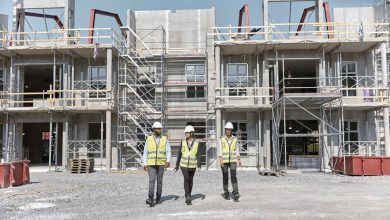Romania’s Compliance with the Energy Performance of Buildings Directive
EPG: 2020 Brings New Rules in the Real Estate Sector
By March 2020, Romania must transpose into national legislation the Directive 2018/844/EU on energy performance of buildings, which will impose on constructors and building owners important rules, such as the obligation to install equipment for charging electric vehicles and systems for automation and control of energy consumption, says Radu Dudau, Director of Energy Policy Group (EPG), a think-tank specializing in energy and coordinator of the ‘Romania Eficienta’ (Efficient Romania) project.
“Energy efficiency of buildings is a priority of EU policies on energy and climate change, as well as security of energy and supply and combating energy poverty. The European building sector is responsible for 40% of the final energy consumption and 36% of the greenhouse gas emissions. The review of the Energy Performance of Buildings Directive has brought new requirements for the promotion of electro-mobility infrastructure and introducing smart technologies in buildings, emphasizing the dimension of public health and quality of life for the users of buildings,” explained Radu Dudau, Director and Co-founder of EPG.
By transposing the Directive 2018/844/EU into the national legislation, an obligation appears for investors/owners/administrators, as the case may be, to ensure the equipment of new buildings, as well as of existing buildings subject to major renovation, with charging points and embedded infrastructure for electric vehicles. The measure will apply to buildings with more than ten parking places, if the parking is located inside the building or it physically adjacent to the building.
In the case of new residential buildings, as well as in the case of major renovation of the existing residential buildings, with more than ten parking places, their investors or owners, as the case may be, could be required to ensure the installation of embedded piping for electric cables for each parking place, so as to allow the installation at a later stage of charging points for electric vehicles.
Moreover, at the preparation of the technical design of execution and/or documentation for the approval of intervention works, the following aspects could be considered: fire safety related to electric vehicles and charging infrastructure; parking infrastructure dedicated to electric bikes and means of transport for people with reduced mobility; smart metering; facilitating the use of batteries of electric vehicles as an energy source.
Mandatory temperature control system in each room
Also, for the new buildings and the existing buildings subject to major renovation an obligation could be introduced to install self-regulating devices and systems of automation and control of energy consumption. For example, for new buildings whose urban planning certificate was issued after March 10, 2020, investors will have to ensure their equipment with devices allowing the separate automated adjustment of temperature in each room of the building and/or of the building unit, if this is technically and economically feasible.
Other provisions are included in the draft law amending and supplementing Law no. 372/2005 on energy performance of buildings, put up for public debate by the Ministry of Public Works, Development and Administration, as competent authority. The draft transposes at national level the provisions of Directive 2018/844/EU for the amendment of Directive 2010/31/EU on energy performance of buildings.
In Romania there are over 8,300,000 buildings, of which most were built before 1990 and have energy losses by 2-3 times higher than modern buildings. Energy efficiency measures can reduce by up to 40% the energy consumption of a building. Thermal energy for heating and hot water accounts for approximately 70% of the consumption of a residential building. By appropriate thermal insulation and by implementing efficient heating solutions, energy consumption can be reduced to half.
About ‘Romania Eficienta’
‘Romania Eficienta’ is a private project, of national public interest, carried out by Energy Policy Group (EPG) in partnership with OMV Petrom, company that financially contributes with sponsorship of the program worth EUR 4 million until 2022. The project started in the summer of 2019 and consists of carrying out a national multiannual energy efficiency program, at least until 2022. ‘Romania Eficienta’ aims to help reaching the energy efficiency targets of Romania set under the EU Directives for 2030 in terms of reduction of carbon emissions and increasing energy efficiency, both through information and education campaigns and by conducting concrete projects of deep renovation of public buildings, in various regions of the country. You will find more details on romania-eficienta.ro website.







